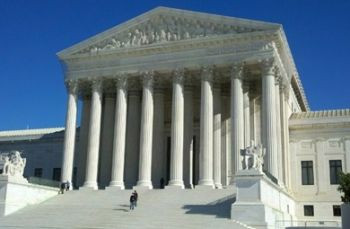Obama's Health Care Law battle nears Supreme Court

President Barack Obama’s controversial health care law or ObamaCare was upheld as constitutional by a federal appeals court in Cincinnati Wednesday but it paved the way for critics to take it to the U.S. Supreme Court.
“We find that the minimum coverage provision is a valid exercise of legislative power by Congress under the Commerce Clause,” two of the three judges on the 6th U.S. Circuit Court of Appeals panel concluded, rejecting a challenge by the Michigan-based Thomas More Law Center.
But the law center’s attorney, David Yerushalmi, says his client was likely to go to the U.S. Supreme Court. “Clearly our case won’t resolve all the issues, because we don’t raise the state rights issue, but we are the only one that is currently ripe for Supreme Court review that raises the challenge on behalf of an individual,” he told The Washington Post.
The Thomas More Law Center has two options. It can ask for a review by the full circuit court or go directly to the U.S. Supreme Court, which had earlier rejected petitions by critics for an expedited review, saying the issue must first be examined in appeals courts.
As many as 16 more cases against Obama’s health care law are still pending in the federal courts, including one in Florida involving attorneys general of 27 states who say the legislation violates state sovereignty. Sixteen states have taken legislative action to oppose elements of the health reform bill.
“While the decision in the 6th Circuit Court of Appeals is disappointing, it is only the first of several opinions we expect on the constitutionality of the law in the coming months,” Karen Harned, executive director of the Small Business Legal Center, which is challenging the law in Florida and is part of the National Federation of Independent Business, said in a statement.
On behalf of four Michigan residents, the Thomas More Law Center had argued that it was unconstitutional for the federal government to force Americans to buy health insurance and that it would cause financial hardship. It also said the Patient Protection and Affordable Care Act, signed by Obama last year, was too broad and could lead to more federal mandates.
Defending the measure, the government argued that the law’s provisions should be seen in light of the broader goal of bringing down health care costs and reforms such as protecting people with pre-existing conditions.
Concurring with Judge Boyce F. Martin, an appointee of President Jimmy Carter, was Judge Jeffrey Sutton, an appointee of President George W. Bush. Sutton is the first Republican appointee on the federal bench to affirm the constitutionality of the law’s individual mandate clause.
Dissenting Judge James Graham, who was appointed by President Ronald Reagan, was of the opinion that if the exercise of power is allowed and the mandate upheld, “it is difficult to see what the limits on Congress’ Commerce Clause authority would be.” “What aspect of human activity would escape federal power?”
The White House was pleased with the ruling and celebrated it. “Today the Affordable Care Act, and the millions of Americans and small businesses benefitting from it scored another victory when the 6th Circuit Court of Appeals ruled that the law is constitutional,” the president’s assistant, Stephanie Cutter, wrote on the official blog.
“We’re gratified by today’s ruling, which came from judges appointed by Democratic and Republican presidents who agreed that the law’s individual responsibility provision (sometimes called the minimum coverage provision) is constitutional,” she added.
Tracy Schmaler, spokeswoman of the U.S. Justice Department, commented, “Throughout history, there have been similar challenges to other landmark legislation such as the Social Security Act, the Civil Rights Act, and the Voting Rights Act, and all of those challenges failed … We believe these challenges to health reform will also fail.”
But the government’s argument for the health care law is based on the Commerce Clause – the constitutional provision that says Congress can regulate commerce, meaning the buying and selling of goods and services, Harned of the Small Business Legal Center wrote in a Fox News opinion column. “Is a person who is sitting at home on their couch engaging in commerce? The government says yes, which is why it contends that the health care law is constitutional.”
Published by Medicaldaily.com



























